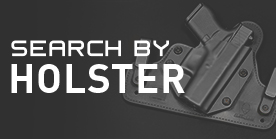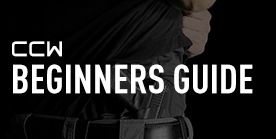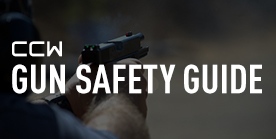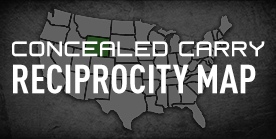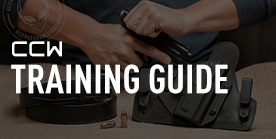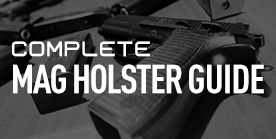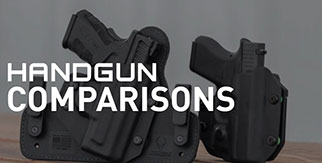
The Duty To Inform Explained
One of the laws that concealed carriers need to be aware of is the duty to inform, which is one of those regulations that exists in some states but not in others. The gist of it is that you have a legal duty to inform a police officer that you are armed upon making contact.
However, this is only a legal requirement in the duty to inform states.
We'll go over how duty to inform laws work, as well as which states have a duty to inform law. We'll also go over what you may be required to do outside of the duty to inform states, as there are some close variations on the theme, so to speak, in other states as well. This is vital information to have in case you ever interact with police while carrying concealed so it behooves you to have a grasp on it. Bear in mind that this isn't legal advice, but a discussion of publicly available information.
Duty To Inform Law Types

Broadly speaking, duty inform laws fall into several formats: inform without being asked, inform if asked, no duty to inform and "other."
Basically, the way they work is some states require you to inform police without being asked. Others require you to disclose if asked, others have no requirement to inform and then you have states that defy classification.
For instance, the District of Columbia, Hawaii, New York and California are examples of the latter category. At the moment, concealed carry laws in Washington D.C. and Hawaii are in limbo due to a number of lawsuits at the time of this writing, so we won't touch on those.
New York and California both have no law at the state level requiring disclosure if a person is armed. They do, however, at the county - in the case of California - or municipal level, in the case of New York. Certain counties of California have a duty to inform law, as does the city of Buffalo, New York, though you probably shouldn't inform officers in Buffalo that the Bills aren't making the playoffs. They already know and will not be amused.
At present, only Georgia and Vermont don't require citizens inform officers in any way shape or form that they are armed if carrying concealed. Georgia is an interesting example, as you do have to keep your permit on you if carrying but law enforcement can't actually detain on suspicion of not having a permit.
In the hard duty to inform states, you have to inform an officer that you are armed without being asked. In some states, a person is only required to disclose that they are carrying if asked by a police officer but otherwise don't have to.
There is some gray area, however, as most states do require you to produce your concealed carry permit if asked though not necessarily if you are armed. Be prepared to show proof of licensure if contacted by law enforcement, as this is a best practice.
The Duty To Inform States

Presently, there are 12 explicit duty to inform states. In these states, you have to inform a police officer that you are carrying a firearm. You will also have to produce a concealed carry permit for the officer to verify that a person is legally carrying.
Those states are:
Note that of the above, only Maine is a constitutional carry state, though Oklahoma recognizes the right to carry without a permit of citizens from constitutional carry states. In other words, a person that resides in a constitutional carry state can carry sans permit in Oklahoma, provided they substantiate their residency with a valid ID card from that state.
That said, residents and non-residents alike in these states must disclose to an officer that they are carrying without being prompted. In simpler terms, "here is my license, registration, proof of insurance, officer. By the way, I have a concealed carry license and I am armed.
officerAs a general rule, passengers in vehicles should disclose if armed as well, and without being asked.
Required To Inform If Asked
Of the remaining states, only two have the duty to inform if asked, namely Arizona and Illinois. In those states, you must disclose to an officer that you are carrying if they ask. You will then have to produce a permit.
In all other states, you only have to produce a concealed carry license.
However, it bears mention at this point that while you may not be legally required to inform law enforcement that you are carrying a concealed firearm, it may be a very good idea for you to do so. While supererogatory, a lot of police have gone on record over the years as saying they wished more people would.
If there's one thing that cops hate, it's surprises. Remember that they just want to get home safe, just like everyone else.

Reactions may range from "do you have a permit for that" to...let's just say nonplussed. Since you want any encounters from law enforcement to go smoothly, it's a best practice to inform an officer that you are carrying.
Granted, that's all up to you. Again, it's supererogatory; you don't have to but it's a good idea to do it.
How To Tell An Officer You Are Concealed Carrying
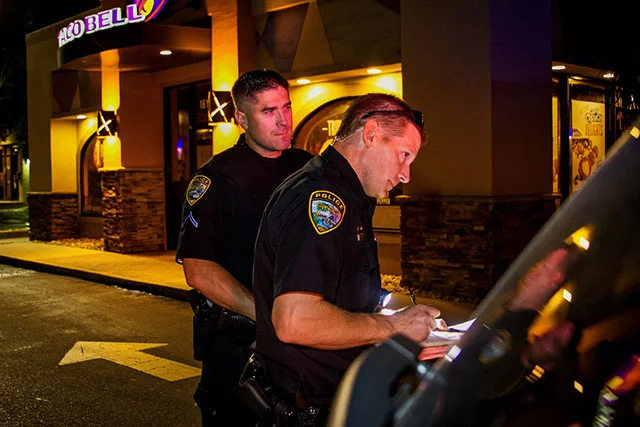
If you are required by the laws of your state to inform (compulsory or if asked) or if you've decided that you're going to of your own free will, there is a right way to handle it.
If informing an officer, do so early. Basically, when they get up to the window, you need to say "I am carrying a concealed firearm, officer, and I have a permit for it" as soon as you have an opportunity. You may be asked where it's located, or you may wish to tell them. At that point, let them talk you through what to do next; DO NOT make any sudden movements at that point.
A good way to handle it is to have some prepared phrasing in mind. (Call center workers call this "scripting.") For instance, a good way to put it would be:
"Good evening, officer. I just want to inform you that I am carrying a concealed pistol, it's located (wherever it is) and I have a permit for it. How would you like me to proceed?"
This gets the disclosure out of the way, lets them know you have a permit, lets them know the location of the gun and puts the ball in their court on what the next step is. Again, you need to let them talk you through it and follow their instructions in a calm, controlled manner.
Officers may wish to have you exit the vehicle, where they will secure the pistol to their satisfaction. They may say "that's fine; so long as I don't see yours, you won't see mine" or they may guide you through every motion that you will take while producing your license, registration and permit. It all depends on the cop in question.
You should know by now what, if any, duty to inform you have. If you don't have a duty to do so, you'll have to decide whether you will or not. If you've decided that you have, make sure to let the officer take charge and talk you through the encounter.
Have you had to inform an officer you were carrying?
What worked and what didn't? Let us know in the comments below!


